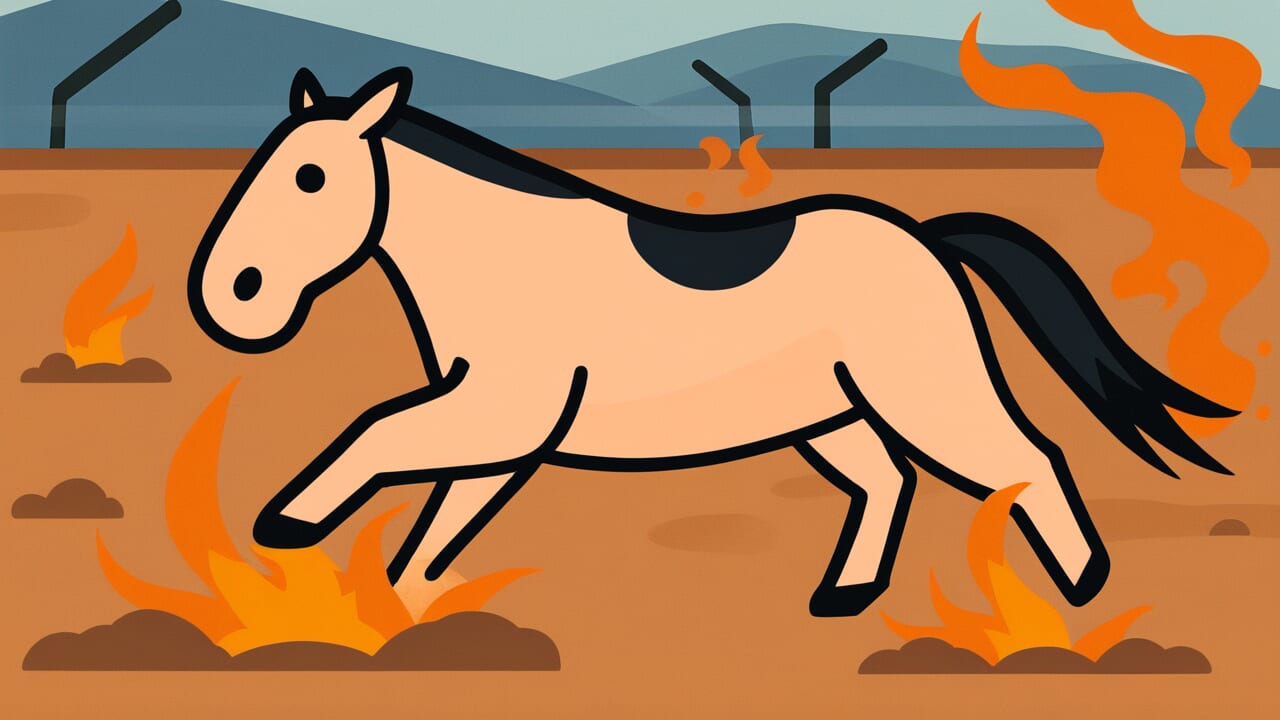How to Read “A dying horse farts”
Shini uma ga he wo koku
Meaning of “A dying horse farts”
“A dying horse farts” is a proverb with two distinct meanings. The first meaning describes something absolutely impossible.
Since a dead horse passing gas defies common sense, people use this phrase to express things that cannot possibly happen.
The second meaning is more hopeful. It describes a situation that seemed completely hopeless but unexpectedly turns around for the better.
People use this proverb when a plan everyone thought was impossible actually succeeds. It also fits situations where recovery seemed out of reach but suddenly happens.
When used in the second sense, it expresses both surprise and joy at an unexpected turn of events.
Today, people understand this proverb both negatively as “not a chance in a million” and positively as “a miraculous comeback.”
The context tells you which meaning applies. Either way, it powerfully expresses situations that defy common sense.
Origin and Etymology
No clear written records explain the origin of this proverb. However, the structure of the phrase offers interesting insights.
Horses have been familiar animals to Japanese people since ancient times. They served in farming, transportation, and warfare.
Through close observation, people learned the details of horse behavior and biology.
Among these observations was a fact about dead horses. Gas sometimes accumulates inside a horse’s body after death.
This gas occasionally escapes, making sounds like flatulence.
However, most people considered “a dead horse farting” impossible. A being whose life has stopped cannot perform an act associated with living.
This common-sense feeling forms the foundation of the proverb.
What’s fascinating is how this proverb carries two opposite meanings. One is the negative sense of “absolutely impossible.”
The other is the positive sense of “something given up for lost unexpectedly improves.”
This duality likely exists because people knew from experience that dead horses could occasionally pass gas.
Something thought absolutely impossible rarely becomes reality. The surprise and hope of such moments are captured in this proverb.
Usage Examples
- A company on the verge of bankruptcy landing a major contract is truly like a dying horse farts
- I thought him passing the exam was like a dying horse farts, but he actually succeeded
Universal Wisdom
The proverb “A dying horse farts” reflects the essence of the human heart swinging between hope and resignation.
Every day, we classify things as “possible” or “impossible.” This judgment is necessary wisdom for living.
Yet it also limits our possibilities.
This proverb has been passed down through generations because our ancestors knew from experience that the boundary between possible and impossible is actually unclear.
Humans have a quality of not completely abandoning hope even in desperate situations.
Reason tells us “it’s over,” yet somewhere in our hearts we believe in miracles. This contradictory psychology might be the core of what makes us human.
The proverb also teaches us about the danger of “common sense.” When something everyone thought impossible becomes reality, we realize how strong our assumptions were.
Looking back at history, many great achievements were realized as events like “a dying horse farts.”
The dual nature of this proverb represents life’s uncertainty itself. Both “absolutely impossible” and “miraculously realized” are valid meanings.
Life is interesting and frightening precisely because it’s unpredictable.
Our ancestors expressed this truth through the familiar image of a horse.
When AI Hears This
Maintaining life requires constantly using energy to preserve order within the body. Digesting food, repairing cells, maintaining body temperature.
All these activities maintain a “low entropy state,” an organized condition.
But at the moment of death, this order-maintaining system stops. Gas accumulated in the intestines is no longer controlled by muscles.
It releases naturally according to pressure differences. This isn’t controlled life activity but a phenomenon purely following physical laws.
What’s interesting is that things “held back” by will or muscles during life are released when death removes those constraints.
The system transitions to a natural physical state. Life, in other words, is the act of forcibly maintaining a thermodynamically unnatural state.
Water flows from high to low places. Heat moves from warm to cold areas.
Similarly, high-pressure gas flows toward lower pressure. Post-death flatulence is simply part of the system returning to a “natural disordered state.”
This proverb shows that even in states that appear completely finished, energy transfer and change continue.
The entire universe is the same, ultimately heading toward “heat death” where all energy differences disappear.
The unexpected phenomena occurring along the way might be the essence of this world.
Lessons for Today
This proverb teaches us living in modern times the importance of flexible thinking.
We tend to judge things simply as “can do” or “cannot do.” Modern society especially emphasizes efficiency.
We often exclude low-probability options from the start.
However, this proverb teaches the danger of assuming something is “absolutely impossible.”
At the same time, it shows the value of maintaining hope. Dreams and goals you’d almost given up on can sometimes come true in unexpected ways.
Don’t decide that possibility is zero. Keep the small flame of hope alive.
But balance is crucial here. Don’t cling to impossibilities and lose sight of reality.
Yet don’t be so bound by common sense and conventional thinking that you miss new possibilities.
If you’re thinking “it’s impossible” about something right now, is it really? Are you dismissing someone’s challenge as “that’s impossible”?
This proverb teaches us to hold both humility and hope.



Comments